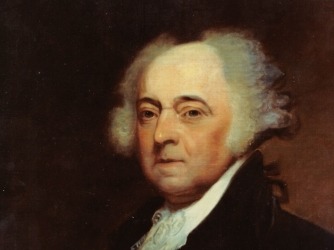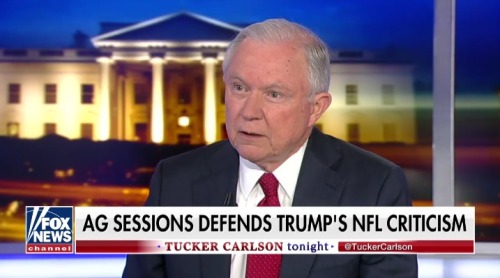Is it free speech or an affront to Americans everywhere? The answer can be complicated, and it almost certainly depends on who you’re talking to.
It didn’t take long for widespread NFL protests to draw ire from conservatives, who view athletes who kneel during the national anthem as disrespectful to the United States, right down to our Constitution.
Of course, that Constitution guarantees the right to free speech, but that right didn’t always come so easily in the United States. And even now, research suggests people are more likely to defend speech with the First Amendment when they agree with the message.
Take, for instance, this Tucker Carlson segment with Attorney General Jeff Sessions. Carlson regularly covers First Amendment issues that affect conservatives (often far to the right), and Sessions recently appeared on the program with concerns that free speech is in peril at college campuses, especially when it’s conservatives doing the talking.
“(Free speech is) deeply embedded in our whole approach to life, and we need to push back,” Sessions said, adding that he couldn’t think of another time in U.S. history when free speech was threatened.
However, the right to free speech has always been a little dicey for Americans.

Let’s take a trip back in time to another hyper-partisan period in the U.S., when this America thing was just getting going. The nascent government actively prosecuted people who the administration at the time viewed as hostile toward their party, the Federalists.
Federalists were big into trade, a national bank and limiting leadership positions to the wealthy. Their opponents were worried these things would lead to an aristocracy like the one they’d fought to leave behind.
John Adams, the first and only Federalist president (above), was suspicious of the press, going so far as to call some anti-Federalist journalism “terrorism.” A year into his presidency, Congress made it illegal to write or print anything false or in “malicious” opposition to the federal government, the legislature or the president. This law, the Sedition Act, was essentially an effort to shut up anti-Federalists, and it carried a punishment of up to two years in prison and a $2,000 fine.
Adams’ secretary of state pored over anti-Federalist newspapers in search of Sedition Act violations. Eventually, Republican editors across New England were indicted on Sedition Act or libel charges, resulting in 15 convictions. Among those indicted was Benjamin Franklin’s grandson, who died before his case went to trial.
That was the situation when Vermont Congressman Matthew Lyon was charged with violating the Sedition Act for writing a strongly worded letter to the editor and for reading a letter he didn’t even write in public.
Lyon was an Irish immigrant and former indentured servant who started a Republican newspaper and then entered politics. He was criticized for opposing Adams, so Lyon wrote a letter to the editor that pretty much said, sure, but Adams has “unbounded thirst for ridiculous pomp, foolish adulation, or selfish avarice.” Ouch.
If that wasn’t enough, while campaigning in Vermont, Lyon would read aloud from a letter that a poet had written criticizing Adams. Even though he hadn’t written or published it, the government essentially said reading out loud counts, too, and they indicted him.
Lyon pleaded not guilty, and even though he argued during his trial that the Sedition Act violated the First Amendment and was unconstitutional, a jury found him guilty. He was sentenced to four months in jail and a $1,000 fine.
The conviction didn’t kill his political career, though, maybe because everyone else was through with the Federalists, too. Lyon was reelected to Congress after he got out of jail.
Through the Sedition Act, the government made it clear that free speech is free, but only if you’re on the right side. And guess what? People are still way more willing to defend things like protests as free speech if the message fits in with their views, particularly when it comes to race.
Two psychology researchers from the University of Kansas tackled this in the Journal of Personality and Social Psychology.
“People pull out free speech as a defense when they’re defending racist speech, but not when they’re defending simply aggressive or negative speech,” psychology professor Christian Crandall said on the podcast Hidden Brain.
In his experiment, people read about baristas who were allegedly fired for their online rants about customers. One post used racist language and stereotypes to complain about black customers. The other barista complained about customers, but without mentioning race at all.
Crandall and Mark White, a graduate student who co-wrote the study, found that the more negatively someone viewed African Americans, the more aggressively they’d invoke “free speech” when they read the racist post. When people with equally negative views of African Americans read the other post, the free speech argument was more muted.

We’ve heard a lot about free speech this year, and it can morph into a gray area quickly when the First Amendment is protecting neo-Nazis and white supremacists. But it’s still important to pay attention when the defense of free speech isn’t applied evenly.
In the same interview where Sessions said free speech is under attack, Carlson asked if Trump’s comments on the NFL players were in conflict with the first amendment. No, Sessions said, because the president has the right to free speech, and the NFL protests are demeaning to this country.
“He believes – and I believe – that people should take a moment before a football game and stand when the national anthem is played,” he said. “What’s wrong with that? It’s not political.”
Contact Mollie Bryant at bryant@bigiftrue.org or 405-990-0988.
